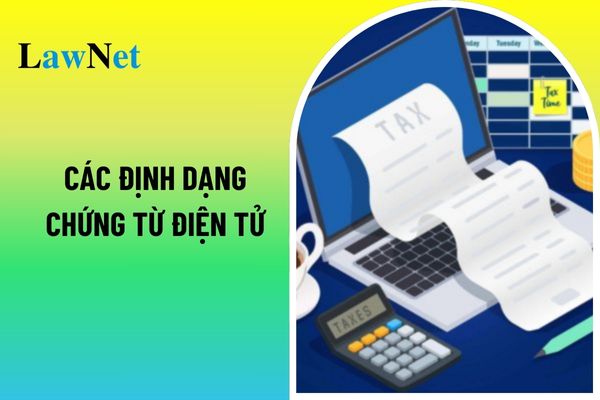What formats do e-records include? What responsibilities does the General Department of Taxation of Vietnam have in managing e-invoices and records?
Vietnam: What formats do e-records include?
Pursuant to Clause 2, Article 33 of Decree 123/2020/ND-CP, specific regulations on the format of e-records are as follows:
[1] Format of e-records for personal income tax deduction:
Organizations that withhold personal income tax, when using records as regulated at Point a, Clause 1, Article 30 of Decree 123/2020/ND-CP in e-form, must self-develop software systems to utilize e-records ensuring mandatory contents as regulated in Clause 1, Article 32 of Decree 123/2020/ND-CP.
[2] e-records must fully and accurately display the contents of the records to ensure they do not lead to misunderstanding, allowing users to read them by e-means.

What formats do e-records include? What responsibilities does the General Department of Taxation of Vietnam have in managing e-invoices and records? (image from the Internet)
What are principles for the establishment, management, and use of invoices and records in Vietnam?
Pursuant to Article 4 of Decree 123/2020/ND-CP, specific regulations on principles for establishing, managing, and using invoices and records are as follows:
Principles for establishing, managing, and using invoices and records
[1] When selling goods or providing services, the seller must issue an invoice to deliver to the buyer (including cases where goods or services are used for promotions, advertising, samples; goods or services are given, donated, exchanged, used as employee remuneration, and internal consumption (excluding internal circulation of goods to continue production); or goods are loaned, borrowed, or returned) and must fully record the content as per Article 10 of Decree 123/2020/ND-CP. In the case of using e-invoices, they must adhere to the standard data format of the tax authority as per Article 12 of Decree 123/2020/ND-CP.
[2] When withholding personal income tax, collecting taxes, fees, and charges, the tax withholding organization, fee/charge collection organization, and tax collection organization must issue tax withholding records, tax collection receipts, and fee/charge receipts to the income earners subject to tax withholding and taxpayers, and fully record contents as per Article 32 of Decree 123/2020/ND-CP. In the case of using e-receipts, they must adhere to the standard data format of the tax authority. If an individual authorizes tax finalization, a personal income tax deduction record will not be issued. For individuals who do not sign labor contracts or sign contracts under 03 months, payer organizations and individuals can choose to issue a tax deduction record for each tax deduction or one record for multiple deductions within a tax period. For individuals signing labor contracts of 03 months or more, payer organizations and individuals shall issue only one tax deduction record for a tax period.
[3] Before using invoices or receipts, businesses, economic organizations, other organizations, households, or individuals must register their use with the tax authority or notify issuance as per Article 15, Decree 123/2020/ND-CP, Article 34, and Clause 1, Article 36 of Decree 123/2020/ND-CP. For invoices or receipts printed by the tax authorities, the tax authorities will issue notifications of issuance according to Clause 3, Article 24 and Clause 2, Article 36 of Decree 123/2020/ND-CP.
[4] Organizations, households, and individuals using invoices purchased from tax authorities must report the usage status for printed, self-printed, or purchased receipts from tax authorities as per Article 29 and Article 38 of Decree 123/2020/ND-CP.
[5] The registration, management, and use of e-e-invoices and records must comply with the regulations on e-transactions, accounting, tax, tax management, and this Decree.
[6] Invoice and record data from the sale of goods, provision of services, tax payment transactions, tax deduction, and payment of taxes, fees, and charges are the database to serve tax management and provide invoice and record information to relevant organizations and individuals.
[7] Businesses, economic organizations, and other organizations authorized to third parties to issue e-invoices for selling goods and providing services must still show the name of the selling unit as the authorizing party. Authorization must be documented in writing between the authorizing party and the third party, detailing invoice authorization (authorization purpose, duration, payment method for the authorized invoice), and must notify the tax authority when registering to use e-invoices. If the authorized invoice is an e-invoice without a tax authority's code, the authorizing party must transfer the e-invoice data to the tax authority via a service provider. The Ministry of Finance provides specific guidelines on this matter.
[8] Fee and charge collection organizations authorized to third parties to issue fee and charge receipts must still show the name of the collecting organization as the authorizing party. Authorization must be documented in writing between the authorizing party and the third party, detailing receipt authorization (authorization purpose, duration, payment method for authorized receipts), and notify the tax authority when announcing the receipt issuance.
What responsibilities does the General Department of Taxation of Vietnam have in managing e-invoices and records?
Pursuant to Clause 1, Article 57 of Decree 123/2020/ND-CP, specific regulations on the responsibility of the tax authority in managing e-invoices and records are as follows:
The General Department of Taxation of Vietnam is responsible for:
- Developing a database on e-invoices, invoices printed by the tax authority, and e-records to serve tax management and support the state management of other state agencies (police, market management, border guards, related agencies), serving the needs of verification and reconciliation of invoices by businesses, organizations, and individuals;
- Notifying the types of invoices and records that have been issued, reported lost, or are no longer valid for use.

